Review of 'SFX Book Con 2'
 https://www.foyles.co.uk/SFX-Book-Con-2
https://www.foyles.co.uk/SFX-Book-Con-2
I make no secret of the fact that I love Science Fiction and Fantasy books (see Science Fiction). Having attended many World Science Fiction conventions in the past I am always interested in any literary events that come up having to do with the genre so when I heard of the “SFX Book Con” I was interested - A one day “convention” run by SFX Magazine, magazine covering all aspects of modern, popular fiction including Science Fiction and Fantasy. I missed the first convention earlier in 2018 but managed to get to this, the second.
The one day event was held in the top floor meeting area of Foyle's bookstore on Charing Cross Road in London. It brought together 19 authors and a number of interested fans. The day consisted of four panel talks of authors with breaks in between including a long break between the second and third for a signing session though there was an additional session at the end of the day though I missed the last half of the final panel and the rest of the day due to the fact I had to leave early to go to Ziauddin & Malala Yousafzai In Conversation.
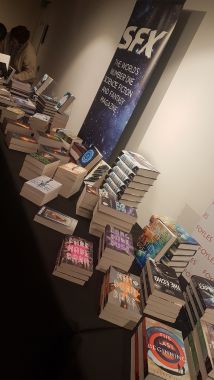
Of course there was a long table of books for sale featuring the works of the authors present and all attendees also received a “goodie bag” consisting of several books and a copy, of course, of the latest SFX Magazine. Entrance to the event cost £18 (standard) or £15 for concessions/members of Foyles' “Foyalty” program.
Panel: "Look Whose Tolkien" (12:45 to 14:00)
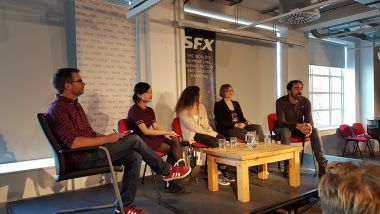
The first panel was the most lively of the day: “Look Whose Tolkien” which featured authors Alexandra Christo, Rebecca Kuang, Jen Williams, and Chris Wooding. The discussion focused mainly on the relevance of Tolkien in the modern age. It was generally agreed that Tolkien is not that relevant nowadays though did set some parameters for specific types of fantastic fiction. Most of the authors also agreed that it was important to first set the parameters of any fiction before writing. Interestingly, Wooding revealed that he writes all of his work by hand with little advanced planning and only puts it into a computer as part of an editing phase.
The conversation got lively when it was suggested that the work of a white-man with “obvious” references to racial stereotypes which had no place in modern fiction. During the question and answer session at the end of the time it was suggested that perhaps the work of Tolkien should be considered in light of the time in which it was written rather than in light of current sensibilities. This conversation quickly grew heated until the moderator called a stop to move onto lighter questions.
Panel: "Tech Wars" (14:15 to 15:15)
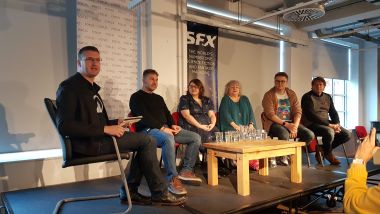
After a short break, the second panel was about “Tech Wars” which featured Tom Hunter (director of the prestigious Author C Clarke Award) as moderator along with panelists Pat Cadigan, Peter F Hamilton, Lauren James, Richard Morgan, and James Smythe. The focus here was about how to keep (hard) Science Fiction stories relevant in a world where what was previously SF is now commonplace. It was agreed that it was foolish to try (for example, setting a story within five years of the present was “foolish” and doomed to failure) though Smythe did repeatedly relate where he has tweaked his work after publication in hard cover before it made it to paperback. Most agreed it was not worth even trying to accurately predict any technology but instead focus on good stories and character. Indeed, when talking about old SF that is technically incorrect (e.g. Neuromancer by William Gibson) the stories are still relevant with both of these in place. James surprised the group when relating that she had created a several thousand line spreadsheet to calculate communication delays in her work “The Loneliest Girl in the Universe” where two characters are in separate, fast-moving spaceships.
Cadigan aptly put it in her typically forthright way that technology is a tool, nothing more, nothing less. In writing this is a tool that can be used to assist the plot and character as well as, perhaps, making the book interesting but it should not be the entire focus of the novel.
Signings (15:15 to 16:20)
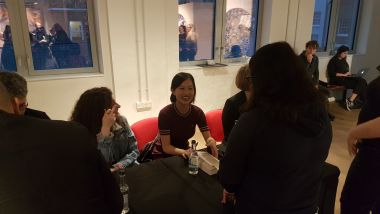
At this point there was a shorter than planned signing session on the fifth floor of the store beside the café. Unfortunately there was a single queue for those wishing to have the authors from the first two panels sign their books so most authors looked bored as they waited for the queue to progress. Here Morgan was very popular though also the slowest in signing as he tended to have things to say to everyone approaching him with books…
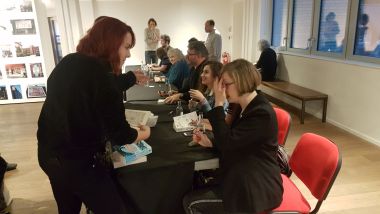
Panel: "Keeping it Real" (16:20 to 17:20)
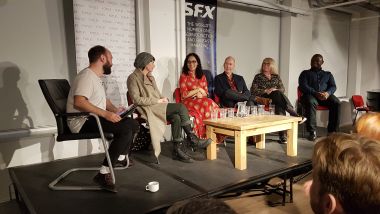
The rest of the day focused on perhaps lighter topics with the “Keeping it Real” panel discussing how to ground fantastic writing sufficiently that it does not lose readers. The panelists were Anne Charnock, Sarah Lotz, Nick Setchfield, Tasha Suri, and Tade Thompson.
All agreed that politics must always be involved in any work of fiction (indeed, the question was whether anyone could name a piece of work that did not involve politics). Further, the suggestion was that basic and societally agreed “facts” must be present in order to keep the work relevant. Thompson admitted to an odd process he uses for his characters where he imagines how they deal with their bodily fluids as he contended this determined a lot of what his characters were like and their habits (for example, a bladder issue requiring they frequently visit the toilet).
Panel: "Paradox Lost" (17:45 to ...)
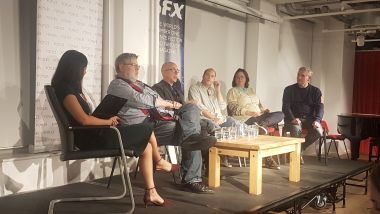
The final panel of the day “Paradox Lost” featured writers M.R. Carey, Rebecca Levene, Kate Mascarenhas, Lavie Tidhar, Francesco Dimitri and Stephen Cox (the later two being late additions to the programme). The conversation was in regards to parallel worlds though an early point was made that all fiction takes place in a parallel world. It was, however, agreed that when writing specifically about parallel worlds it is important to stick to the rules (no matter how silly) in order to maintain consistency otherwise you risk losing your audience (this was a point also made in the previous panel). Additionally, the core of the world or the characters it features have to be recognizeable by the reader.
Regrettably, I had to leave this panel about 20 minutes into the discussion…
Conclusion
It was an interesting day and it was very good to hear some authors I know little about. Several I am now interested in learning more about and will be picking up their work. The organization of the day was quite good though there were a few annoyances such as the event timings reported being completely thrown out the window from pretty much the first and also the fact that they ran out of books from several of the more interesting but perhaps lesser read authors meaning that though I would have liked to have purchased them I was not able to do so. This seems like an odd oversight for a bookstore. The room was quite comfortable if a bit cramped though it might have been nice to have drinking water rather than having to resort to the large queues in the café for refreshment. As I previously stated, I think the signing session could have been organized much better which is, again, quite odd for a bookstore to not be on top of.
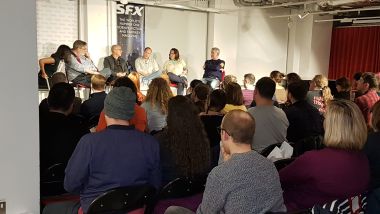
All in all, an enjoyable and interesting day.
Rating: “Really good but I have some issues”
Review Date: 2018-11-10
Foyle's - Charing Cross Road
Location: London (England)
Address: 107 Charing Cross Road, London WC2H 0DT ENGLAND
Public Transport:  Tottenham Court Road
Tottenham Court Road  Leicester Square
Leicester Square
URL: https://www.foyles.co.uk/Public/Stores/Detail.aspx?storeid=1011
 This is Foyles' flagship store located just south of Tottenham Court Road tube station on Charing Cross Road. In recent years the notoriously difficult to navigate store has been renovated and now has a spectacular central atrium with book departments on five floors with a cafe on level 5 and an meeting space on level 6.
This is Foyles' flagship store located just south of Tottenham Court Road tube station on Charing Cross Road. In recent years the notoriously difficult to navigate store has been renovated and now has a spectacular central atrium with book departments on five floors with a cafe on level 5 and an meeting space on level 6.